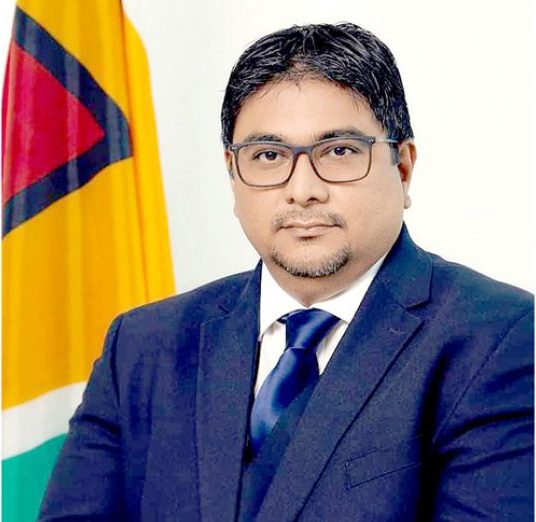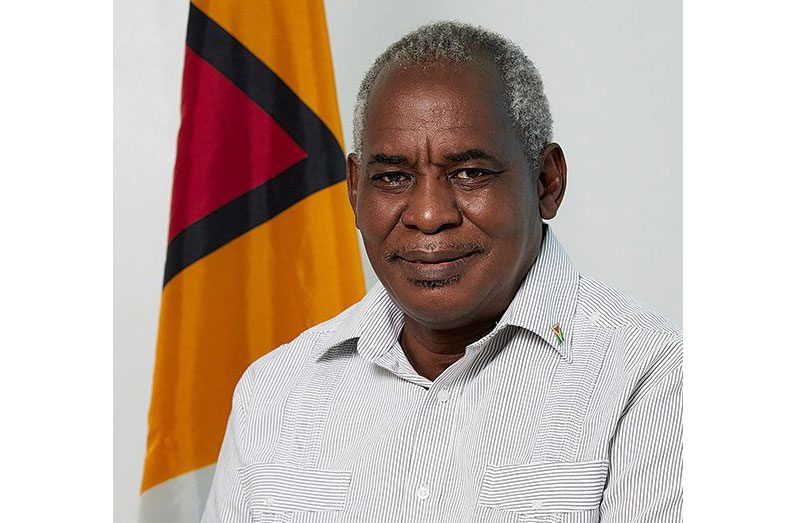— but cannot tolerate human trafficking, says Minister Benn
— such illegality has nothing to do with race and will expose Guyana to international sanctions, points out MP Datadin
GUYANA should not contribute to the overarching criminal enterprise of human trafficking by being a transshipment point and imposition of travel restrictions on groups known to be involved in this illegality cannot be more appropriate.
These were the sentiments shared by Home Affairs Minister Robeson Benn and government Member of Parliament (MP) Sanjeev Datadin, while appearing on a television (TV) programme titled, “Let’s Talk Politics,” Saturday last.
“We have to take the responsible position as a country to deal with this matter, we cannot ethically and morally be involved in the trafficking and smuggling of people in the 21st century, of any race, we cannot be involved in it,” Benn said.
The Home Affairs Minister explained that according to the data available, the situation has been such in Guyana that over the last five to seven years the country has been seen as a “major transit point” for persons leaving their countries hoping to reach the United States – Mexico border.

He explained that the situation is so dire that upon their arrival in Guyana, persons of Cuban and, in most cases, of Haitian nationality, provide fictitious addresses to immigration officials before being “marshalled and shepherded” away by “coyotes” to neighbouring countries.
This was the case in December 2020 when a group of 26 Haitians who were detained, provided Lot 110 Barrack Street, Kingston, Georgetown, as the address where they would be staying while in Guyana, but investigations revealed the location to be that of the Suriname Airways Office, along with an empty lot.
“The difficulty that we have associated with this problem is that one, there is the ethical and moral issues with respect to what these people find themselves in, either as people being trafficked or smuggled and I out point out that quite a number of Haitians are young females and even young children,” he said.
“They are exploited along the way for their labour, for their money; sometimes they are abandoned, they are breaching our borders, the land borders are closed, so there’s no way that they should be allowed to come into our country and depart illegally and also, we have the problem of the corruption of the system, there’s a pervasive attempt to corrupt the system,” he added.
Benn highlighted that the Government of Guyana welcomes persons of various nationalities entering the country with the intention of settling and establishing themselves, which would help with the development of the country, but would not tolerate persons who use the country for sinister objectives.
“We want people to come here and work with us to help develop the country, to regenerate, reinvigorate our cultural and ethnic mix, but we cannot be having people come into the country, leaving almost immediately and creating problems in terms of the administration, law and order, creating issues in community,” he said.
SPECIAL UNIT
The minister disclosed that the Trafficking in Persons (TIP) unit of the Guyana Police Force (GPF) will be expanded to include a “people-smuggling” unit, while legislation will be strengthened to “properly” handle the issue of human trafficking and people-smuggling, as the two issues are “conflated” and come with a gamut of negative externalities.
“We are aware of the issues of people-trafficking and smuggling also have associations with persons who are involved in drug dealing, drug smuggling, gun smuggling and all those other issues, money laundering, all of those other issues are wrapped up in one if you look at it holistically,” he said.
“If we continue to allow people to come through in this way, we would be participating in what is clearly an illegal criminal activity, allowing people into slavery, allowing people into degrading conditions,” Benn added, as he registered.
He noted that it is unfortunate that the issue is being d in the light that it is, and has now been turned into a political football. He gave a reminder that the decision is warranted in law, in international agreements and from an ethical and moral perspective.
Attorney-at-law Sanjeev Datadin shared similar sentiments. He posited that when persons are allowed the privilege of free access to a country, it is usually to foster development, as he referenced many other countries which have imposed visa restrictions for Haitians entering their territories.
The attorney-at-law explained that with that level of ease of access to any country, persons are not required to provide any valid reason for their stay and as such, take advantage of the mechanism.
“We would welcome persons who come to Guyana to visit or to engage or to work, that is why we have visa free-travel, but is it being used on a scale for a purpose that is sinister and we can’t sit by and allow that to happen,” he said.
OBLIGED
He noted that “kindness shouldn’t be your weakness” and while Guyana welcomes persons, the country also has to account to the global community, and to its neighbours to whom the country is obliged, to take action to stymie a situation which would be detrimental to them.
He explained that for those persons who are desirous of travelling to Guyana for the purpose of settling and developing the country, then a visa would not be a problem, as the visa process is a method of vetting who enters the country and for what.
“Visa don’t mean you can’t enter Guyana, it just means we can do a bit more addressing to ensure that you are coming to Guyana to be in Guyana, to participate in our development or simply to visit; you’re not coming to Guyana to use it as a stepping stone to some wider enterprise that is regnant to the comity of nations and may even be criminal,” he said.
“Trafficking in persons I know there’s perceptions people have, who is it harming? What are you doing? But you should not allow or condone that sort of behaviour because … associated with that is with larger criminal enterprise of various kinds traditionally, that is what has happened,” he added.
The attorney-at-law explained that the spin being peddled by some sections of society that Guyana is implementing visas for Haitians is not the “whole story” and must be looked at in a comprehensive manner, taking into consideration all the necessary evidence.
He posited that anyone who suggests the decision is one made upon the premise of race has “no idea” of Guyana’s immigration architecture, as he gave a reminder that the first two groups which noticeably required visas to visit the country were the Indians and the Chinese. The vast majority of counties in the CARICOM block and in Africa also require Haitians to have a visa to visit. According to the Hentley Passport Index, Haitians enjoyed visa-free or access to visa issued on arrival to 49 countries and territories, ranking the Haitian Passport at 95th in terms of travel freedom.




.png)









